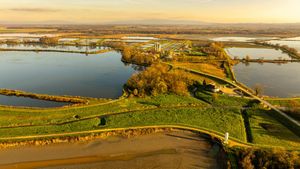With the 2024 United Nations Climate Change Conference of the Parties (COP29) gearing up to take place from November 11 to 22 in Baku, Azerbaijan, the spotlight is firmly on the urgent need for global action against climate change. Hot on the heels of last year's COP28 held by the United Arab Emirates, which saw significant progress on various climate initiatives, COP29 is expected to intensify this momentum and build upon the successes achieved at its predecessor.
The stakes could not be higher. Climate change impacts, such as extreme weather events, rising sea levels, and biodiversity loss, are felt across the globe, making COP29 imperative for charting the course forward for climate resilience. The theme of this year’s conference focuses on improving climate finance, fostering global partnerships, and addressing the pressing challenges faced by vulnerable communities, particularly those located in developing countries.
One of the cornerstones of COP29 is the discussion surrounding climate finance. Nations will be exploring the establishment of new climate finance goals to provide resources to developing countries grappling with the harsh realities of climate change. The UAE has long championed the call for increased climate finance, especially for small island developing states (SIDS) and least developed countries (LDCs). The Loss and Damage Fund, introduced at COP27, will receive significant attention, aiming to operationalize financial support for those facing severe climate consequences.
The UAE, which played host to COP28, is taking the reins once again at COP29. The national pavilion, aptly named “Accelerate Action Together,” aims to facilitate collaboration and dialogue among various stakeholders. It will serve as the primary hub for discussions on topics like mobilizing climate finance and transitioning to renewable energy. More than 60 thematic side events will highlight innovative initiatives geared toward food and water security, decarbonization, and biodiversity protection.
The UAE’s perspective is particularly unique, as it strives to assure no nation is left behind. This will include focusing on the most at-risk communities who often bear the brunt of climate impacts. The nation’s strong advocacy for biodiversity protection will also be emphasized, as it aims to implement the Global Climate Finance Framework to facilitate billions of dollars for climate adaptation and mitigation.
Health also takes center stage at COP29, bringing attention to the World Health Organization's (WHO) call to position health at the core of climate discussions. The WHO asserts climate change isn't just about the environment but also encompasses health crises. This intersection of climate and health was underscored by WHO Director-General Dr. Tedros Adhanom Ghebreyesus, who highlighted the moral and strategic reasons to place human health as the primary measure of climate success.
This year’s COP29 emphasizes creating synergies between health and climate action. Recommendations calling for the integration of health metrics within Nationally Determined Contributions (NDCs) showcase this approach. Particularly, the WHO’s guidance aims to help countries weave health benefits and climate risks together, ensuring responsible policies are laid out across various sectors, including transport, energy, and urban planning.
To materialize these ambitions, COP29 will facilitate structured dialogues, showcasing several workshops, exhibitions, and panels across its two main zones—the Blue Zone for formal negotiations and the Green Zone for public engagement. This setting fosters collaboration between young climate advocates, government representatives, and international organizations, emphasizing the importance of youth leadership.
The UAE's commitment to enhancing climate action does not stop at financial discussions. It’s also about exploring technological innovations and promoting green strategies across agriculture, energy efficiency, and waste management, weaving sustainable practices directly within urban planning. Highlights of the UAE pavilion will include deliberations on how artificial intelligence (AI) can effectively mitigate challenges like food insecurity, illustrating the nation’s drive for tech-savvy solutions to climate issues.
But amid these discussions, negotiators face the pressing task of finalizing the Global Climate Finance Framework, which is pivotal for unlocking funding necessary for effective climate mitigation and adaptation strategies. Countries' commitments under their NDCs will undergo scrutiny to assess alignment with the ambitious 1.5 degrees Celsius warming target outlined in the Paris Agreement.
With significant momentum generated from COP28 and continuing innovations surfacing aimed at combating climate change, COP29 stands as not just another conference but as another foundational stone in the long process of tackling this global challenge. The aspirations set forth here will echo throughout future climate negotiations, emphasizing the interconnectedness of health, economic stability, and sustainability.
Overall, COP29 is projected to serve as both catalyst and crucible, forging the global commitment necessary to respond effectively to climate challenges. With time slipping to meet climate goals, the conference's outcomes could prove pivotal for ensuring resilience across the world’s most vulnerable communities, driving collaborative action and securing resources for adaptation and mitigation.



